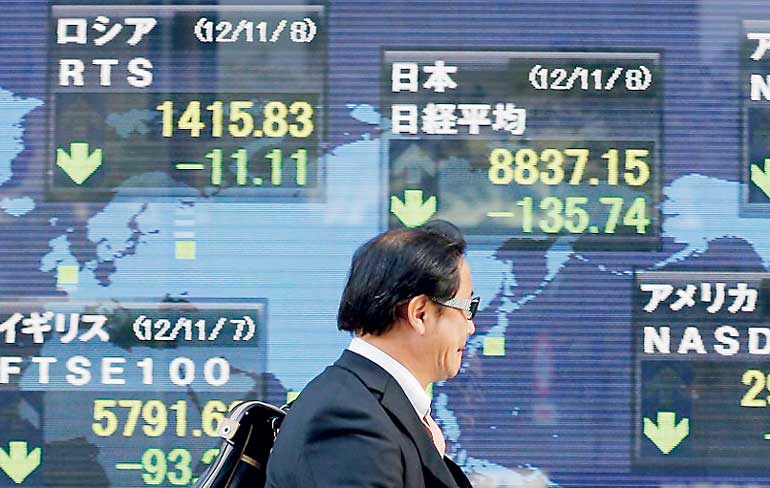Friday Feb 20, 2026
Friday Feb 20, 2026
Friday, 12 June 2015 00:00 - - {{hitsCtrl.values.hits}}

Asian stocks rose on Thursday, encouraged by gains on Wall Street, while the New Zealand dollar tumbled to a five-year low after the central bank cut interest rates for the first time in four years.
South Korea’s central bank also eased, cutting its rate to a record low 1.50% to offset the potential impact of an outbreak of Middle East Respiratory Syndrome (MERS).
Spreadbetters expected a flat to slightly lower open for Britain’s FTSE, Germany’s DAX and France’s CAC. While Greece appeared to move towards finally clinching a cash-for-reform deal with its creditors, lingering uncertainly was seen capping European share prices.
MSCI’s broadest index of Asia-Pacific shares outside Japan rose 0.5%.
Market reaction was limited to latest Chinese data that showed the world’s second largest economy’s fixed-asset investment grow more slowly than expected, while growth in retail sales and factory output steadied.
The Shanghai Composite Index .SSEC nudged down 0.2%.
Tokyo’s Nikkei added 1.4% while Australian shares gained 1.3% and South Korea’s Kospi advanced 0.3%.
US stocks jumped overnight, helped by gains in technology and financial shares. The Dow rose 1.3% and the S&P 500 gained 1.2%.
Wall Street had suffered through much of the week, weighed by concerns that the Federal Reserve would hike rates sooner rather than later, and fears that Greece would default on its debt.
In currencies, the New Zealand dollar slid more than 2% on the day to a five-year low of $0.7000 after the Reserve Bank of New Zealand cut rates to 3.25 percent. Most economists had not expected a cut while market players had said it would be a close call.
The kiwi took a further hit as the RBNZ, which had hiked rates just last year, joined the global rate-cutting club and said it would ease again if needed.
“The RBNZ has again proved to be more flexible than the market gives it credit for,” said Michael Turner, a strategist at RBC Capital Markets.
“The main message is that it’s just very hard to find upside risks to inflation right now and the bank is getting on the front foot to push it higher.” The South Korean won showed a muted reaction to the rate cut there, with the Bank of Korea expected to have eased sooner or later. The easing did nudge South Korea’s 10-year bond yield below that of its U.S. counterpart for the first time in nearly 10 years.
The New Zealand dollar slumped 2.5% against the US dollar on Thursday, hitting a five-year low after the Reserve Bank of New Zealand surprised some by cutting interest rates and flagging the chance of more easing.
The kiwi was on track for its biggest daily loss in four years, dropping to $ 0.6998 NZD=D4 in early London trade, with the RBNZ entering an easing cycle at a time when the Federal Reserve is looking to raise interest rates possibly later this year.
“The RBNZ move was a surprise and has taken a toll on the kiwi,” said Geoff Yu, currency strategist at UBS, London.